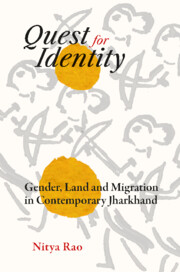13 - Conflicts and Contradictions: Land Laws in the Santal Parganas
Published online by Cambridge University Press: 26 July 2023
Summary
Introduction
During fieldwork in the Santal Parganas in February 2006, I was one day accosted by a policeman – the head of the local thana (police station). He was visiting the village where I was staying to talk to the parganait (leader of a group of villages) about the tense situation in the area. There were press reports on the growing activities of Naxalite groups in the region, he said, led by ‘civil elements from outside’. Training in the use of firearms was being organised and an atmosphere of violence being created in this otherwise peaceful region.
I soon realised that he was talking about the neighbouring panchayat (village council) of Pachwara in Pakur district, which has witnessed strong resistance to a large coal mining project in the last three years. I was told that compensation has now been paid out in cash and the resistance broken. Work was on full swing on the project, and it was now only a few people who were creating problems – these were the Naxalites, who needed to be arrested at the earliest!
This brief encounter raised a number of issues: How had the state actually managed to acquire land and get an agreement on cash compensation from the local adivasi people? Was any dialogue ever held or was this agreement a one-sided one? Was this solution not in contradiction to the existing protective land policies, as legalised through the Santal Pargana Tenancy Act (SPTA) of 1949? And was it not a gross violation of the Supreme Court's Samata judgment of 1997?
The fundamental issue behind these questions seems to be one of differing conceptualisations of land in cultural and political terms by the local people and the state, including the meaning of and principles underlying the notion of non-alienability of land in today's context. Economic growth and ‘national development’ require additional resources, whether minerals or land, for power generation, construction, industry or infrastructure development. Both industry and government make a strong case for the extraction and use of resources which are ostensibly being ‘wasted’ in ‘undeveloped’ and ‘remote’ adivasi regions such as Jharkhand. This view of land use and development, however, differs from local adivasi understandings. For the adivasis, apart from food production, land is valued for its ability to provide security and reinforce a sense of personhood (Rao, 2008).
- Type
- Chapter
- Information
- Quest for IdentityGender, Land and Migration in Contemporary Jharkhand, pp. 302 - 330Publisher: Cambridge University PressPrint publication year: 2024



